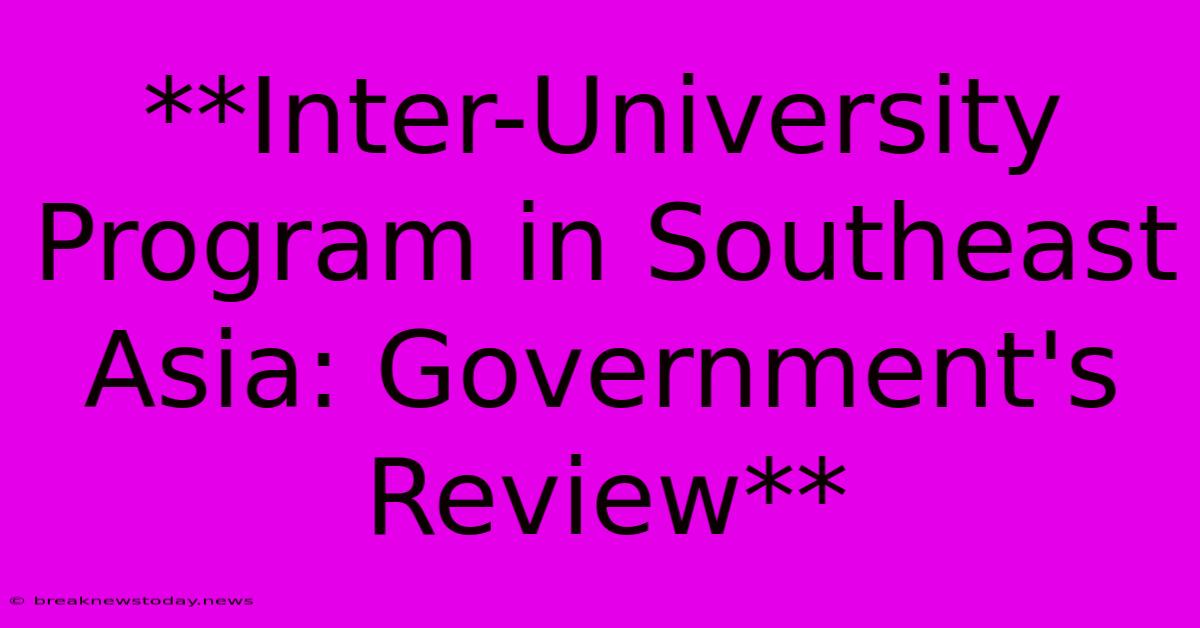**Inter-University Program In Southeast Asia: Government's Review**

Discover more detailed and exciting information on our website. Click the link below to start your adventure: Visit Best Website naughtynakes.com. Don't miss out!
Table of Contents
Inter-University Program in Southeast Asia: Government's Review
Southeast Asia is a region brimming with potential. With diverse cultures, rich history, and rapidly growing economies, the region presents a unique opportunity for collaboration and growth. One avenue for fostering this development is through inter-university programs, initiatives that allow students and faculty to connect, share knowledge, and build international partnerships. However, the success of these programs relies heavily on government support and oversight.
This article delves into the government's role in reviewing and evaluating inter-university programs in Southeast Asia. We explore the key considerations for a successful review process, the benefits of robust inter-university collaborations, and the potential challenges that governments must address.
The Need for Government Review: Ensuring Quality and Impact
Inter-university programs, while promising, require careful management to ensure they meet their objectives. The government plays a crucial role in this process, providing a framework for quality assurance, accountability, and impact assessment.
Key Considerations for Government Review:
- Program Alignment: Do the inter-university programs align with national development priorities and regional strategic goals?
- Curriculum and Pedagogy: Are the programs designed to foster intercultural understanding, promote innovative teaching practices, and equip students with relevant skills for the future?
- Student Mobility and Exchange: Are there adequate mechanisms in place to facilitate smooth student mobility, ensure student safety, and address potential cultural barriers?
- Faculty Collaboration and Research: Do the programs encourage faculty exchange, collaborative research, and the dissemination of knowledge?
- Sustainability and Funding: Are there sustainable funding models in place to support the long-term viability of the programs?
Benefits of Effective Inter-University Programs: Building a Brighter Future
Well-designed and effectively managed inter-university programs can yield numerous benefits for both participating institutions and the wider Southeast Asian region:
- Enhanced Academic Excellence: Fosters cross-cultural learning, promotes research collaboration, and expands the intellectual horizons of students and faculty.
- Strengthened Regional Integration: Encourages collaboration on shared challenges, promotes cultural understanding, and builds lasting relationships between academic institutions.
- Economic Development: Equips graduates with the skills and knowledge needed to contribute to the region's growing economies.
- International Cooperation: Creates a platform for knowledge sharing and cooperation on issues of global importance.
Challenges and Strategies for Government Review: Navigating Complexity
While the benefits of inter-university programs are undeniable, governments face several challenges in effectively reviewing and managing these initiatives:
- Lack of Standardization: Lack of consistent program frameworks and assessment criteria across different countries can make it difficult to compare program quality and effectiveness.
- Funding Constraints: Limited government budgets can make it challenging to adequately fund and support inter-university initiatives.
- Administrative Barriers: Bureaucratic processes and regulations can sometimes hinder student mobility and faculty exchange.
To address these challenges, governments can adopt the following strategies:
- Establish a Regional Framework: Develop a regional framework for inter-university programs that outlines common goals, standardized quality assurance measures, and funding mechanisms.
- Promote Collaboration: Encourage collaboration between universities, government agencies, and regional organizations to foster a cohesive ecosystem for inter-university initiatives.
- Invest in Capacity Building: Provide training and resources to university administrators and faculty to improve their understanding of inter-university programs and their effective implementation.
Conclusion: A Collaborative Effort for Shared Success
The government's role in reviewing inter-university programs is crucial for ensuring their effectiveness and impact. By carefully assessing program alignment, curriculum quality, student mobility, faculty collaboration, and sustainability, governments can foster an environment where inter-university programs thrive and contribute to the development of a more integrated, prosperous, and peaceful Southeast Asia.
This requires a collaborative approach involving governments, universities, and regional organizations. By working together, stakeholders can create a lasting legacy of educational excellence and regional cooperation.

Thank you for visiting our website wich cover about **Inter-University Program In Southeast Asia: Government's Review**. We hope the information provided has been useful to you. Feel free to contact us if you have any questions or need further assistance. See you next time and dont miss to bookmark.
Featured Posts
-
Young Thug Sentenced 15 Years Probation
Nov 02, 2024
-
Dlugie Intro Krotkie Outro Nowe Trendy W Muzyce
Nov 02, 2024
-
Latinas Unidas Hosts Dia De Los Muertos
Nov 02, 2024
-
Central Cordoba Vs San Lorenzo En Vivo Liga Profesional
Nov 02, 2024
-
Day Of The Dead Costume Guide
Nov 02, 2024
